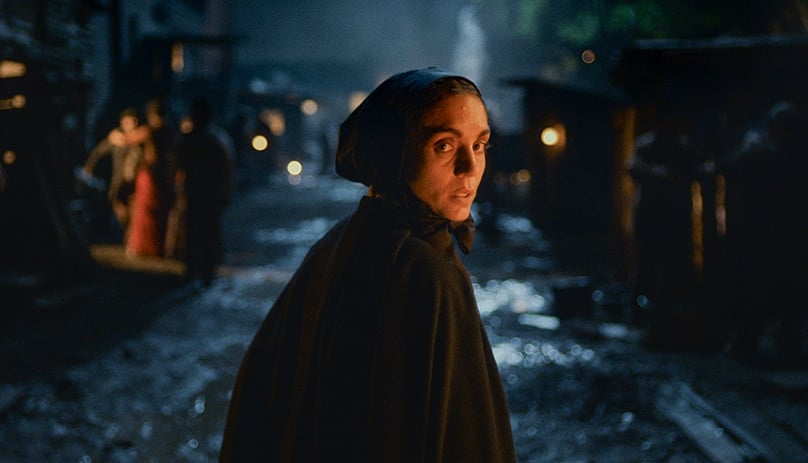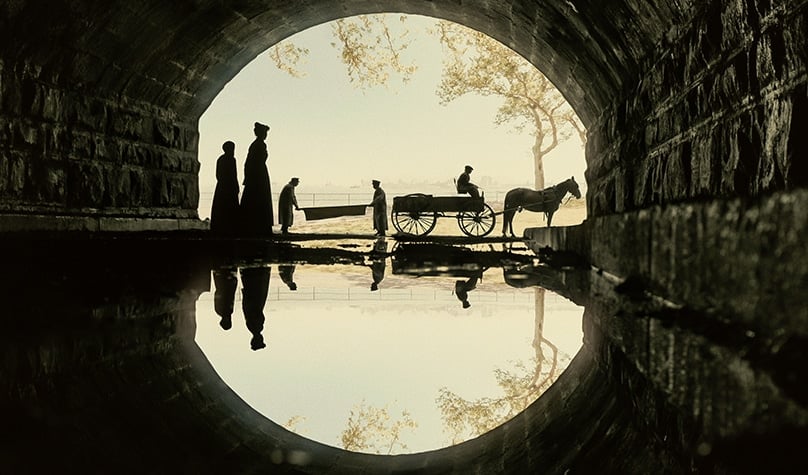
After founding the Missionary Sisters of the Sacred Heart of Jesus in 1880, Mother Francesca Cabrini felt an overwhelming call to share the love of Christ to the poor and orphaned in China.
Her persistence led to a meeting with Pope Leo XIII in 1887, who expressed skepticism due to her ill health and perceived limitations as a woman. “Not to the East, but to the West,” the pope told her.
Instead of China, Mother Cabrini was sent to New York City with six sisters to minister to her fellow Italians.
The saint’s life story is the subject of Cabrini, the latest biopic from Angel Studios.
Released on 8 March to coincide with International Women’s Day, Cabrini is a glowing (yet at times, critical) tribute to the contribution women make within the church and secular world.
In response to the pope’s doubts, Mother Cabrini replies that, “We can serve our weakness, or we can serve our purpose. We can’t do both.”
Though it’s more fiction than fact, the meeting between Mother Cabrini and the Holy Father goes to the heart of what director Alejandro Monteverde (Sound of Freedom) is trying to express in Cabrini.
By holding to her convictions, Mother Cabrini and her six sisters became witnesses to God’s “Empire of Hope,” as she described her network of orphanages, schools and hospitals.
After arriving, Mother Cabrini and her sisters quickly learn the harsh realities of life in 19th-century New York City as these remarkable women encounter violent resistance, sexism and racism from both church and state.
With their love of God and those most vulnerable to strengthen their resolve, the sisters persist and begin plans for a new orphanage.
One orphanage turns into two and, with a growing need for medical assistance for the disenfranchised Italian community, soon the sisters have the sights set on a hospital that would provide high-quality care to all people and which would help fund the growth of their mission across the world.
The strength and unwavering faith shown by the sisters in caring for the vulnerable, abandoned and impoverished, despite facing sexism, racism and illness, is exemplified by billions of women each day.
Monteverde’s Cabrini is artistically well-realised.
From sets and costume design to sound and editing, the film’s creative team built an authentic world to carry this remarkable story.
Celebrated Spanish cinematographer Gorka Gomez Andreu, well known for his work with shadow and light, draws the audience into this dark and gritty world from the very first scene.
The haunting glow of streetlamps and bonfires on the gloomy streets of Five Points brings the past to life, with Gorka’s contrast between soft tones and harsh silhouettes adding visual richness to the plot.
In contrast, the beautifully-lit Vatican scenes evokes a sense of detachment between the Italians in Rome and their countrymen in New York.
The slums are likewise contrasted with shots of the rolling fields of Hudson Heights outside New York, foreshadowing the place where the sisters would build a boarding school and where Mother Cabrini would herself be buried.
It’s a compelling piece of Catholic moral filmmaking, with each frame a work of art stirring the heart to compassion, sorrow and anger.
As Mother Francesca Cabrini, Italian actress Cristiana Dell’Anna delivers a standout performance that is authentic, emotive and engaging.
Dell’Anna’s commanding on-screen presence conveys the passion and vulnerability that moved Mother Cabrini to bring about her “Empire of Hope,” her global network of institutions.
The film’s supporting cast is just as exceptional with an ensemble that includes well-known faces John Lithgow, David Morse and Giancarlo Giannini—though they are perhaps underused.

While the story of a faithful woman’s persistence in a world of poverty and oppression unfolds along Catholic moral lines, the screenplay will be criticised for falling into the victim-oppressors setup so common in film today.
It results in a few instances of awkwardly-delivered lines or on-the-nose visuals that overstate a point already firmly made.
When Mother Cabrini is rejected by powerful men, like the pope, the film heavy-handedly has her ask, “Is it because I’m a woman?”
In another scene the sisters attend to a room full of wounded after a mining accident as the local priest sits, incapacitated by shock.
The scene could have shown the sisters’ strength in caring for the injured with more subtlety—let the priest give the men their last rites, rather than making him the foil for the sisters’ virtue.
Despite a few such moments of preachy dialogue or visuals, the film does well to honour historical fact while resisting the lure of transforming the film into a commentary on contemporary politics, especially in a US election year.
The plight of Italian immigrants in 19th-century America is allowed to stand on its own two feet, rather than becoming a proxy for the polarising refugee crisis that has enveloped the Western world.
With Cabrini garnering overwhelmingly positive reviews from both religious and secular publications, Angel Studios seems to have found a winning formula and is quickly become a new phenomenon in the film industry.
The studio’s emotive and grounded moral films have a production quality that rivals Hollywood, with The Chosen going from strength to strength and Sound of Freedom the 10th highest grossing film of last year.
Monteverde’s Cabrini will no doubt enjoy this same high praise and in doing so educate millions on the remarkable life of Mother Francesca Cabrini, whose perseverance changed the church and the world for the better.
Cabrini, rated PG-13 for “thematic material, some violence, language and smoking,” premieres in selected cinemas across Australia.
